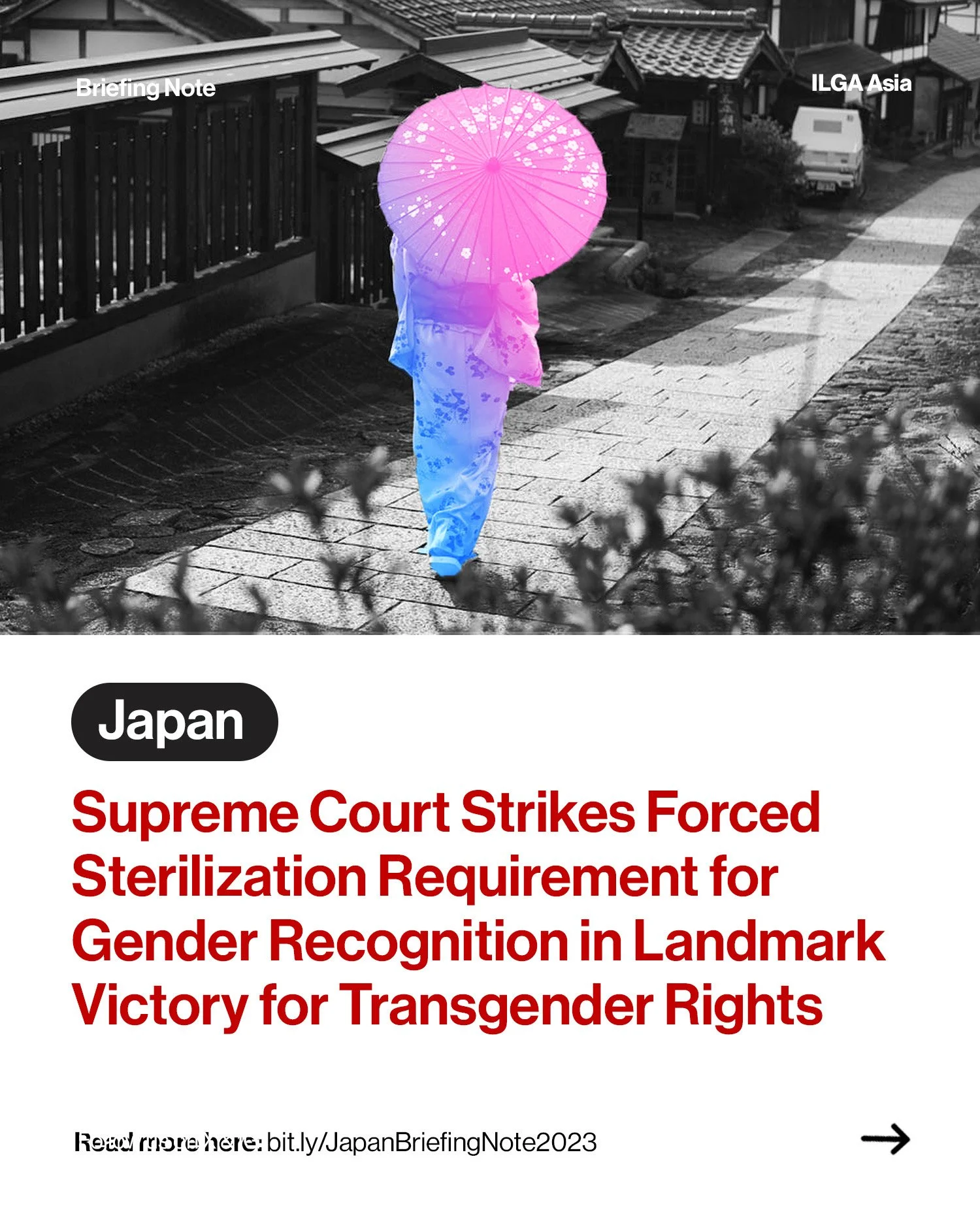Japan: Supreme Court Strikes Forced Sterilization Requirement for Gender Recognition in Landmark Victory for Transgender Rights
On 25th October 2023, the Supreme Court of Japan ruled that requiring transgender persons to undergo sterilization surgery, in order to legally change their gender markers, is unconstitutional. The landmark decision represents a significant step towards the recognition of transgender rights in Japan, which has otherwise been heavily criticized for its abusive and outdated laws on gender identity. Under the 2003 Japanese Law on Special Cases in Handling Gender for People with Gender Identity Disorder or the GID Act, transgender people wishing to officially change their gender marker must appeal to a Family Court which can issue a decision authorizing the modification of gender registration in the family registry if the applicant meets certain requirements under Article 3. These requirements include being over the age of 18 and unmarried, as well as having no underage children. Further, it requires a medical diagnosis of gender dysphoria by at least two medical experts. The applicant must also prove that their genitals "physically resemble those of the opposite gender" and that they must be surgically sterilized or not possess any functioning reproductive organs. These requirements, particularly that of forced sterilization, have been described by UN Experts and the World Professional Association for Transgender Health (WPATH) as unscientific and violative of human rights.
Responding to a petition filed by an unnamed transgender woman, a 15-judge Grand Bench of the Supreme Court unanimously held the sterilization requirement of the GID Act to be unconstitutional. Her petition for change in gender marker had been previously denied by two lower courts in 2019 and 2020. At the Supreme Court the plaintiff argued that the last two requirements of Article 3 of the GID Act “violated her constitutional right to pursue happiness and live without discrimination, and posed significant physical pain and financial burden to transgender people.” The Court held that the mandatory surgical removal of reproductive organs was “highly invasive” and “too restrictive” as a requirement for legal change in gender and violated the individual’s right to pursue happiness under Article 13 of the Japanese Constitution. The Court also held that the GID Act forced transgender persons into a “cruel choice between accepting the sterilization surgery that causes intense bodily invasion and giving up important legal benefits of being treated according to their gender identity”.
Nevertheless, the judgment only applies to the sterilization requirement of the GID Act and does not address the constitutionality of requiring gender affirming surgery to obtain change in gender registration or any of the other requirements under the Act. The Supreme Court did however direct the High Court to look into the legality of the requirement of gender-affirming surgery. The 2023 judgment also reversed a previous ruling from 2019 by the same court that held the Act and its requirements to be constitutional.
While the ruling is a step in the right direction, the plaintiff expressed disappointment with the judgment explaining that she still cannot ultimately change her gender marker in the government registry owing to the existence of the other requirements under the GID Act. Activists have been calling for a comprehensive reform of the GID Act which pathologizes transgender identities by incorrectly categorizing gender dysphoria as a “mental disorder”, thereby undermining the dignity of transgender persons and perpetuating stigma. Despite other progressive Court rulings in the context of bathroom restrictions for transgender employees and prevention of workplace harassment of transgender persons, LGBTIQ individuals in Japan continue to face significant hurdles in achieving full equality before the law.
In 2023 the Japanese legislature passed the Bill for Enhancing Public Awareness of Diversity in Sexual Orientation and Gender Identity which has been criticized for falling short of providing any real protections for LGBTIQ individuals against discrimination, since it does prescribe any actual penalties for those who engage in discriminatory practices.
"The Supreme Court of Japan's ruling to eliminate the forced sterilization condition is a strong validation of the inherent human rights previously withheld from the transgender community. Although this marks considerable progress, it is merely an initial move towards genuine equality. ILGA Asia stands united with the transgender community in Japan and urges the Japanese Government to engage in thorough legal reform. This reform should guarantee the fundamental right to legal gender recognition without medical conditions and should protect the sanctity of personal freedom and bodily integrity." Henry Koh, Executive Director, ILGA Asia.
ILGA Asia welcomes the landmark ruling by the Supreme Court as a catalyst for broader and enduring change for transgender rights in Japan. Further, ILGA Asia urges the Japanese Government to urgently undertake comprehensive reform of laws in order to ensure equal rights and protection under the law for all LGBTIQ individuals. ILGA Asia will continue to emphasize the importance of robust legal reforms and social awareness campaigns to ensure that transgender individuals are fully respected and protected in all aspects of their lives.
For further queries, please contact:
Ajita Banerjie, Senior Research and Policy Officer (ajita@ilgaasia.org)
Nadine Hassan, Senior Communications Officer (nadine@ilgaasia.org



